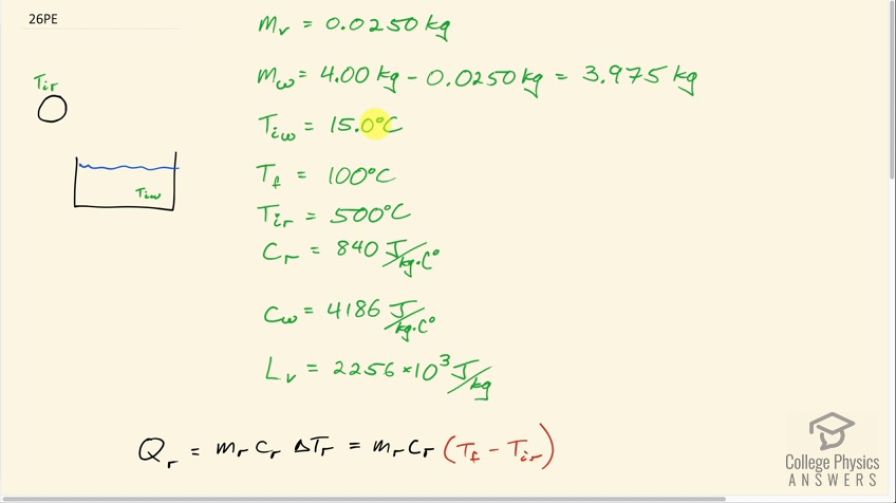Question
Indigenous people sometimes cook in watertight baskets by placing hot rocks into water to bring it to a boil. What mass of rock must be placed in 4.00 kg of water to bring its temperature to , if 0.0250 kg of water escapes as vapor from the initial sizzle? You may neglect the effects of the surroundings and take the average specific heat of the rocks to be that of granite.
Final Answer
Solution video
OpenStax College Physics for AP® Courses, Chapter 14, Problem 26 (Problems & Exercises)

vote with a rating of
votes with an average rating of
.
Calculator Screenshots
Video Transcript
This is College Physics Answers with Shaun Dychko. We are going to be boiling some water by putting hot rocks into it. So the water has an initial temperature of 15.0 degrees Celsius and the rocks are initially at 500 degrees Celsius; the final temperature has to be 100 degrees because that's the boiling point for water and the mass of water that we start with is 4.00 kilograms but we are told that in the initial sizzle when the rocks are inserted into the water, there's a bit of water that will turn into vapor and that's 0.0250 kilograms of it will become vapor leaving behind 3.975 kilograms in the basket. We look up the other pieces of data that we need; we have the latent heat of vaporization for water is 2256 times 10 to the 3 joules per kilogram and the water has a specific heat of 4186 joules per kilogram per Celsius degree and the specific heat for the rock is that of granite, which is 840. Okay! So the heat lost or the heat, you know, transfer from the rock is its mass times its specific heat times the change in temperature. Now this is going to be a negative number as we know since the final temperature is going to be lower than the initial temperature so we'll have 100 here minus 500 which will make negative 400 so this is gonna represent a loss in heat for the rock. The heat gained by the water is going to be its mass, at least the mass of water left behind that did not vaporize, multiplied by the specific heat times its change in temperature plus the heat lost due to the phase change into vapor so the mass that turned into vapor multiplied by the latent heat of vaporization and this change in temperature is T final minus T initial for the water. Notice that the T f does not get a subscript r here and it does not get a subscript w because since they are in contact with each other, the rock and the water will have the same final temperature so there's no need to distinguish these two final temperatures. Now the heat transfer from the rock is going to be the opposite to the heat transfer from the water— one is the negative of the other— because the magnitude of the heat exchanged will be the same for both but the direction's are opposite so one's gonna be the negative of the other and so we are gonna say that the heat transfer from the rock is the negative of the heat transfer from the water. Now because we know that this term here, Q r we talked about is going to be negative, and so we need to turn this number into a negative and we do that just by putting a negative sign in front of it and now these two things are gonna be equal. So we have mass of the rock times specific heat of the rock times its change in temperature equals the negative of all of this and then we solve for the mass of the rock that we need to do this boiling by dividing both sides by c r times T f minus T ir. And so the mass of the rock then is negative of 3.975 kilograms— mass of water left behind in the water state— times the specific heat of water times the change in temperature of 100 degrees Celsius— final temperature—minus—initial— 15.0 degrees Celsius plus the mass of water that vaporizes multiplied by the latent heat of vaporization and all that gets divided by 840 joules per kilogram per Celsius degree— specific heat for granite— times the change in temperature of the rock which is a final temperature of 100 degrees Celsius minus the initial temperate of 500 degrees Celsius. This works out to 4.38 kilograms of rock is needed to boil the 4.00 kilograms of water.
